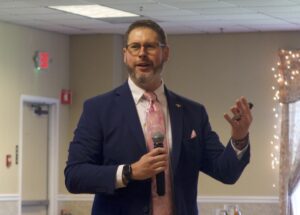Who is a member?
Our members are the local governments of Massachusetts and their elected and appointed leadership.

Eric Atstupenas, general counsel for the Massachusetts Chiefs of Police Association, discusses the First Amendment rights of municipal employees during a MIIA risk management training session with the Massachusetts Mayors’ Association last October.
Understanding the First Amendment rights of public employees is crucial to maintaining a legally sound and productive work environment. While municipal employees do not forfeit their free speech rights when they enter public service, their rights are limited in ways that differ from those of private sector workers.
Eric Atstupenas, general counsel of the Massachusetts Chiefs of Police Association, said the challenge for municipal leaders “lies in balancing employees’ speech rights with the municipality’s interests in maintaining efficiency, discipline, and public trust.”
Atstupenas recently conducted a detailed MIIA risk management training session on navigating the free speech rights of public employees in the workplace. Here are key takeaways:
The legal framework
The First Amendment protects public employees’ speech, but not without conditions. The courts have developed a framework to determine whether speech is protected, typically using a three-step analysis:
1. Is the employee speaking pursuant to official job duties? If so, it is not protected. For example, a fire chief making statements about department funding at a press conference about a fire may be speaking in an official capacity rather than as a private citizen.
2. Does the speech address a matter of public concern? Speech involving political, social or community issues may receive protection, while personal workplace grievances or disputes generally may not.
3. Does the government’s interest in efficient workplace operations outweigh the employee’s speech rights? Using what’s known as the Pickering Balancing Test, a municipality may have grounds for disciplinary action if the speech disrupts workplace operations, erodes public trust, or impacts performance or authority, which outweigh the employee’s interest in speaking on a matter of public concern.
Best practices
• Develop clear policies: Municipal leaders should establish well-defined policies outlining the extent to which an employee’s speech may or may not be protected, particularly on social media. Policies should distinguish between speech in an official capacity and private speech, and they should clarify the consequences of speech that disrupts operations or violates ethics rules.
• Provide training: Employees and supervisors should receive regular training on what constitutes protected speech and when disciplinary actions may be taken. This training should include real-life case studies to illustrate the boundaries of free expression in a government setting.
• Conduct a case-by-case analysis: Each free speech issue should be assessed individually, considering the content, context and impact of the speech. For example, an employee criticizing department management on a personal social media page may be protected, while posting confidential department information may not be.
• Avoid overly broad or selective enforcement: Policies must be enforced consistently. A municipality cannot allow some employees to express personal views, while disciplining others for similar conduct. Selective enforcement can lead to legal challenges on the grounds of viewpoint discrimination.
• Consider alternative disciplinary actions: Not every instance of problematic speech warrants termination or severe disciplinary action. Where possible, consider coaching, reassignment or other corrective measures before resorting to dismissal, especially in cases where speech falls into a gray area.
Pitfalls to avoid
• Don’t misinterpret personal grievances as matters of public concern: An employee complaining about their supervisor in a way that does not implicate broader public issues may not be engaging in protected speech. Courts distinguish between workplace dissatisfaction and legitimate whistleblowing on issues of public concern.
• Don’t retaliate against whistleblowers: Employees who report corruption, mismanagement, or violations of law are often protected under both the First Amendment and whistleblower laws. Disciplining or terminating these employees without clear, documented performance issues can lead to costly legal battles.
• Don’t ignore context in social media cases: Many free speech disputes arise from employee social media posts. Simply because a post is controversial doesn’t mean it’s unprotected. However, posts that undermine public trust in government agencies, threaten workplace harmony, or violate professional ethics may be subject to discipline, particularly when these interests outweigh the employee’s interest in speaking on a matter of public concern.
• Document performance issues separately: If an employee is disciplined shortly after making a controversial statement, they may claim retaliation. To avoid this, municipalities should ensure that all disciplinary actions are well-documented and based on objective performance metrics rather than perceived political or ideological leanings.
• Don’t overstep authority on political speech: Municipal leaders are advised to be cautious when regulating political speech in the workplace. While employees should not engage in political advocacy while on duty or while using government resources, they retain rights to political expression outside of work.
“Consult with your town counsel, city solicitor, or legal advisor before taking action on employee speech,” Atstupenas said. “You want to make sure that you’ve vetted everything through them to avoid stepping into a constitutional landmine.”
Conclusion
By developing clear policies, providing training, ensuring consistent enforcement, and carefully evaluating each case, municipalities can uphold constitutional rights while maintaining effective public service.
Written by Joyce McMahon